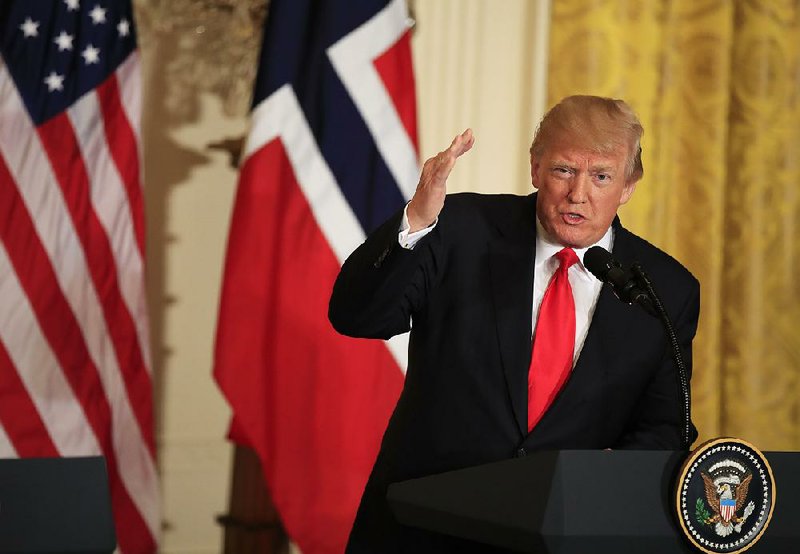WASHINGTON -- As lawmakers from both parties rushed to reach a compromise on immigration, President Donald Trump said Wednesday that he's not backing down on funding a border wall.
"It's got to include the wall," Trump said Wednesday at a news conference where he was asked if he would sign immigration legislation that didn't provide money to begin building a physical barrier on the U.S.-Mexico border. "Security is No. 1, so the answer is you have to have the wall."
Lawmakers involved in the negotiations shuttled between the House and Senate seeking accord on legislation that would give protection against deportation to about 800,000 young illegal aliens who were brought to the U.S. as children, while also meeting Trump's conditions of tighter border security, restrictions on family preferences in immigration and an end to a diversity visa lottery.
Some lawmakers hope an immigration agreement could open the way to a broad spending bill, which in turn could carry disaster relief funds, legislation stabilizing the Patient Protection and Affordable Care Act and other measures that stalled in December.
[U.S. immigration: Data visualization of selectedimmigration statistics, U.S. border map]
A group of more than 100 chief executives, including Mark Zuckerberg of Facebook, Mary Barra of General Motors Co., Apple Inc.'s Tim Cook and Accenture North America's Julie Sweet, joined in the push by Democrats to pass a deal by the end of next week. They wrote to the Republican and Democratic leaders and urged them to "act immediately" to let young people given protection under President Barack Obama administration's Deferred Action for Childhood Arrivals program remain in the country.
"It is critical that Congress act to pass legislation before January 19th," the letter says. "In addition to causing a tremendous upheaval in the lives of deferred-action employees, failure to act in time will lead to businesses losing valuable talent, cause disruptions in the workforce, and will result in significant costs."
Democrats have been insisting that any immigration compromise be part of a spending deal, which is needed to keep the government open after Jan. 19. Lawmakers also haven't reached a consensus on border security and the other terms set by Trump, while a group of conservative Republicans in the House were pushing for a deal with tighter restrictions on immigration.
While Trump has never wavered in his demand to build the wall, he told a group of lawmakers from both parties at the White House on Tuesday that he'd go along with whatever they hammer out.
[PRESIDENT TRUMP: Timeline, appointments, executive orders + guide to actions in first year]
"I will be signing it," Trump told them. "I'm not going to say, 'Oh, gee, I want this or I want that.'"
Meanwhile, Republican and Democratic leaders sought to dispel concerns that a late Tuesday ruling by a federal judge in San Francisco temporarily blocking Trump's decision to terminate the deferred-action initiative would hold back the effort to write the program into the law. The program is to end March 5.
Senate Democratic leader Charles Schumer of New York said on the Senate floor Wednesday that the court decision "in no way diminishes the urgency of resolving the [deferred-action] issue."
Sen. John Cornyn of Texas, the No. 2 Senate Republican, agreed, telling reporters that he's determined to help set up a timetable for further bipartisan negotiations that will also involve top administration officials.
"My sense is that it doesn't change the need for us to act, so we're going forward," Cornyn said.
The administration on Wednesday vowed to request a stay and appeal of the court's deferred-action ruling. The president denounced the federal courts as "broken and unfair."
"It just shows everyone how broken and unfair our Court System is when the opposing side in a case (such as DACA) always runs to the 9th Circuit and almost always wins before being reversed by higher courts," Trump wrote in a tweet, referring to the program by its initials.
The White House suggested the court's ruling would make a legislative deal harder to obtain.
"We find this decision to be outrageous," White House press secretary Sarah Huckabee Sanders said in a statement. "An issue of this magnitude must go through the normal legislative process."
In announcing in September his intent to end the program, which he viewed as abuse of executive power, Trump also pushed Congress to develop a legislative fix, speaking favorably of the young immigrants and suggesting he did not necessarily want them to be deported.
On Wednesday afternoon, the No. 2 lawmakers in both the House and Senate touched gloves, deputized for action at what appeared to be an opportunity to break Washington gridlock.
"Everybody wants to find a deal there, myself included," said Rep. Mark Meadows, R-N.C., chairman of the conservative House Freedom Caucus. "It better be good, because that particular issue is really one of the issues that got this president elected. He can't afford to make a mistake."
Conservative columnist and author Ann Coulter warned Trump after he struck a conciliatory chord on immigration at the Tuesday White House meeting.
"As he considers the utility of walls (and promises), realDonaldTrump should consider that 'Never Trump' was toothless, but 'Former Trump' will bite," Coulter wrote on Twitter.
REPUBLICANS RESPOND
Inside the Capitol among the GOP rank and file, most seem to be either supportive of the negotiations or taking a wait-and-see approach.
It's no secret that the results of the bipartisan, leadership-driven negotiations are likely to produce results that anger the hard right, but less strident Republicans seem to be comfortable, at least so far.
"I think most like where it's going," said freshman Rep. Don Bacon of Nebraska, who represents a competitive district anchored by Omaha and is sympathetic to deferred-action beneficiaries. "There's some exceptions, but there's a general consensus that that is what we need to be doing. And I think that this is an area that's tailor-made for a bipartisan solution. We both want some things here."
Immigration is just one side of the equation. Also at stake is a deal on spending that would uncork tens of billions of dollars in higher Pentagon spending this year alone, along with money sought by Democrats for domestic programs.
Democratic votes are needed to advance such legislation, but top Democrats including Schumer won't agree to a budget deal unless the deferred-action program is dealt with first.
Republicans had long fought perceptions that the two issues were tied together, but they're dropping that pretense now.
"When it comes to how conservatives react to the notion that these things are being linked in discussions, it's sort of nothing new," said Rep. Matt Gaetz, R-Fla. "I think a lot of folks want to see the final product, but I haven't heard some wide-scale revolt to the fact that people are having discussions."
Conservatives in the think-tank world said they were heartened that the negotiations had broadened to so-called chain migration and an immigration lottery that's aimed at promoting diversity.
"I think that for some people, yesterday was a bit of a shock to see just how eager [Trump] is to pass amnesty," said Roy Beck, executive director of NumbersUSA, which advocates for reduced immigration rates. "We were worried that the wall was going to be the big get. ... I think we're thrilled to be in as good a shape as we're in."
Still, frustration is brewing that Republicans aren't doing better after winning control of the White House and Congress in 2016.
"Somehow Chuck Schumer still gets to dictate, 'Oh, I get $60 billion more in nondefense spending, and I get to determine ... [Deferred Action for Childhood Arrivals],'" said Rep. Jim Jordan, R-Ohio. "How does that make any sense?"
Meanwhile, a group of House Republicans, led by Judiciary Committee Chairman Robert Goodlatte of Virginia, unveiled their own immigration bill Wednesday, a measure that embraces conservative goals but would seem to have little chance of ultimate passage.
It would reduce legal immigration levels by 25 percent, block federal grants to so-called sanctuary cities that don't cooperate with federal authorities on immigration issues, and restrict the number of relatives that immigrants already in the U.S. can bring here.
Information for this article was contributed by Laura Litvan, Toluse Olorunnipa, Anna Edgerton, Sahil Kapur, Steven T. Dennis, Jennifer Epstein and Yueqi Yang of Bloomberg News; by Andrew Taylor, Alan Fram and Jill Colvin of The Associated Press; and by Lisa Mascaro, Brian Bennett and Patrick McGreevy of the Tribune News Service.
RELATED ARTICLE
http://www.arkansas…">Immigration sweep hits 7-Eleven
A Section on 01/11/2018


